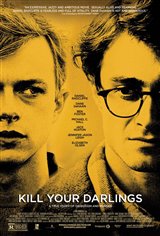Kill Your Darlings is a biographical drama based on the college lives of several writers who were the earliest members of the Beat Generation, including Jack Kerouac, Allen Ginsberg and William Burroughs.
Pictured above (left to right): William S. Burroughs, Lucien Carr, and Allen Ginsberg.
Together, these young men started a cultural movement in the 1950s that inspired celebrated works of literature and influenced the later 1960s Hippie movements. The definition of the Beat Generation can be summed up in a few words: underground, counterculture and anti-conformist. These young men led a bohemian lifestyle that rejected materialism and conformity, and they experimented with drugs and sexuality. Their literary works were considered obscene and racy at the time due to the nature of their content. Even though the members of the Beat Generation were seen as anti-academic and anti-establishment, Kerouac, Ginsberg and Burroughs all attended Ivy League institutions, as well as many of the other men depicted in the film.
Jack Kerouac and Allen Ginsberg attended Columbia University together, and they met William Burroughs – who attended Harvard – through his friend, David Kammerer. David Kammerer was involved in a romantic relationship with Lucien Carr, who is another significant figure in both the Beat Generation and the film itself.
The events of Kill Your Darlings focus largely on the killing of David Kammerer at the hands of Lucien Carr. Kamerrer was an older man who met Carr when the latter was just 14 years old. Kamerrer frequently followed Carr wherever he went, and many accounts of their relationship say that Kammerer actually stalked Carr and was obsessed with him.
The relationship between these two men was filled with ups and downs. On August 13, 1944, Lucien Carr stabbed David Kammerer with a Boy Scout knife and threw his body into the Hudson River.
He later cited self-defense as the reason, claiming the man was a sexual predator who had made unwelcome advances on him. Since the two men ran in the same circle of friends, Jack Kerouac, Allen Ginsberg and William Burroughs were all dragged into the aftermath of the murder. After the murder, Burroughs advised Carr to turn himself in, and then Kerouac helped him dispose of the knife he used in the stabbing and bury Kammerer’s glasses. Both Burroughs and Kerouac would later be involved in the trial, but none were prosecuted. Carr pleaded guilty to manslaughter and subsequently served a short sentence in prison. Ginsberg was fascinated by Lucien and his nontraditional ideals and behavior and was inspired to write about the crime. Burroughs and Kerouac were also inspired by the crime, using it in several of their works.
